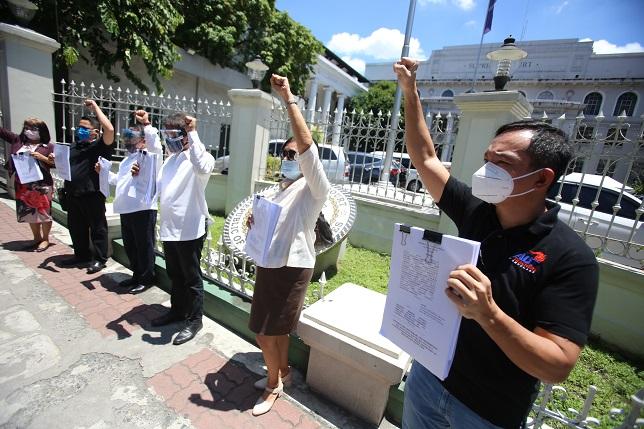Makabayan Bloc asks Supreme Court to strike down anti-terror law

The House of Representatives' Makabayan Bloc has asked the Supreme Court (SC) to strike down the Anti-Terrorism Act of 2020.
The fourth group to mount a challenge against the new law, the lawmakers urged the SC to declare Republic Act No. 11479 as null and void and, more immediately, to stop the government from enforcing it while the case is pending.
A group of lawyers and former Education secretary Armin Luistro; Albay Representative Edcel Lagman; and the Far Eastern University law dean and several professors have also filed petitions against the law.
Like the other groups, the Makabayan bloc assailed the definition of terrorism in the new law, saying it is "so broadly framed as to sweep any speech and any act which would otherwise be protected under Section 4 of the Bill of Rights."
They said the definition is vague and "too unclear that people cannot reasonably know whether they are committing 'terrorism' or not.
"With this vagueness, there will undeniably be instances where Filipinos will not know where social advocacy ends and 'terrorism' begins," the lawmakers said in the 83-page petition, warning of a "chilling consequence" of the law.
The "fatal flaws" in the definition are amplified in other provisions that define crimes punishable under the law, they said.
In addition, the lawmakers questioned the law's provisions on surveillance, saying they violate privacy rights. They said the surveillance power granted by the law is "unbridled and overly broad."
The Makabayan Bloc also claimed that the provisions on the designation and proscription of individuals and groups as terrorists are unconstitutional.
They further said that Section 29, which says terrorism suspects may be detained for up to 24 days before being brought to a judge, provides a detention period that is "arbitrary, unreasonable, and unjustified" and "opens up for a wide range of possibility of torture, force, violence, threat, intimidation, or any other means which vitiate the free will."
The lawmakers argued that Section 29 empowers the Anti-Terrorism Council to authorize arrests, violating the principle of separation of powers. In the Constitution, only a judge can issue arrest warrants upon a determination of probable cause.
They also said the provision allowing prosecutors to move to limit the right to travel of a person facing even a bailable case or place him under house arrest violates the constitutional right to bail.
The lawmakers' group said they acknowledge the need to fight terrorism but said this should not violate Filipinos' rights.
"It must never be done through unconstitutional means; otherwise, the enforcers are susceptible to turn into terrorists themselves, terrorizing the members of the society by depriving them of the mantle of protection accorded by [the] Constitution," they said.
"A draconian law such as the Anti-Terrorism Act of 2020 has no place in a democratic society, and must therefore be struck down," they added.
Other groups, including the National Union of Peoples' Lawyers and retired SC justice Antonio Carpio, are expected to file petitions against the new law. —KBK, GMA News



